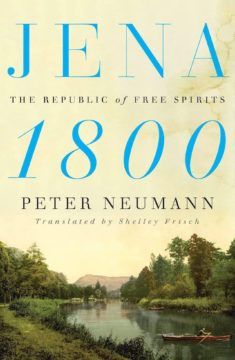Richard Eldridge at the LARB:
 No wonder, too, then, that there is a current public of soi-disant intellectuals eager to learn about past experiments in living, especially those with a significant philosophical dimension. And so we have Peter Neumann’s Jena 1800: The Republic of Free Spirits (translated by Shelley Frisch), “a fascinating and highly readable story of ideas, art, love, and war,” as one blurb has it, and a picture of “a world intoxicated with the possibilities of thought,” according to another. Jena in 1798 to 1800 was a backwater provincial city of 5,000 residents, one-fifth of whom were students. Initially attracted by the presences at the university first of Karl Leonhard Reinhold and then J. G. Fichte, both of whom were associated with the free thinking of Kantianism and the French Revolution, a circle of intellectual friends, including women as equals as well as men, formed around the brothers August and Friedrich Schlegel.
No wonder, too, then, that there is a current public of soi-disant intellectuals eager to learn about past experiments in living, especially those with a significant philosophical dimension. And so we have Peter Neumann’s Jena 1800: The Republic of Free Spirits (translated by Shelley Frisch), “a fascinating and highly readable story of ideas, art, love, and war,” as one blurb has it, and a picture of “a world intoxicated with the possibilities of thought,” according to another. Jena in 1798 to 1800 was a backwater provincial city of 5,000 residents, one-fifth of whom were students. Initially attracted by the presences at the university first of Karl Leonhard Reinhold and then J. G. Fichte, both of whom were associated with the free thinking of Kantianism and the French Revolution, a circle of intellectual friends, including women as equals as well as men, formed around the brothers August and Friedrich Schlegel.
Friedrich and Dorothea Veit (Moses Mendelssohn’s divorced daughter) set up house in Leutragasse 5, where they were soon joined by August and his wife, Caroline (widow to Johann Böhmer and later to marry Friedrich Schelling after divorcing August).
more here.
